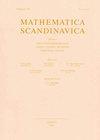预期Jacobian类型的除数
IF 0.7
4区 数学
Q4 MATHEMATICS
引用次数: 0
摘要
雅可比理想为线性型的除数由于与D -模理论的联系,近年来受到了广泛的关注。在这项工作中,我们感兴趣的是期望雅可比型的除数,即梯度理想为线性型的除数,其雅可比理想的关系型与相对于梯度理想加1的约化数相一致。为了能够精确地描述雅可比理想的里斯代数方程,我们提供了一些条件。我们还将雅可比理想的关系类型与由Kashiwara算子的度给出的D -模理论不变量联系起来。本文章由计算机程序翻译,如有差异,请以英文原文为准。
Divisors of expected Jacobian type
Divisors whose Jacobian ideal is of linear type have received a lot of attention recently because of its connections with the theory of $D$-modules. In this work we are interested on divisors of expected Jacobian type, that is, divisors whose gradient ideal is of linear type and the relation type of its Jacobian ideal coincides with the reduction number with respect to the gradient ideal plus one. We provide conditions in order to be able to describe precisely the equations of the Rees algebra of the Jacobian ideal. We also relate the relation type of the Jacobian ideal to some $D$-module theoretic invariant given by the degree of the Kashiwara operator.
求助全文
通过发布文献求助,成功后即可免费获取论文全文。
去求助
来源期刊

Mathematica Scandinavica
数学-数学
CiteScore
0.60
自引率
0.00%
发文量
19
审稿时长
>12 weeks
期刊介绍:
Mathematica Scandinavica is a peer-reviewed journal in mathematics that has been published regularly since 1953. Mathematica Scandinavica is run on a non-profit basis by the five mathematical societies in Scandinavia. It is the aim of the journal to publish high quality mathematical articles of moderate length.
Mathematica Scandinavica publishes about 640 pages per year. For 2020, these will be published as one volume consisting of 3 issues (of 160, 240 and 240 pages, respectively), enabling a slight increase in article pages compared to previous years. The journal aims to publish the first issue by the end of March. Subsequent issues will follow at intervals of approximately 4 months.
All back volumes are available in paper and online from 1953. There is free access to online articles more than five years old.
 求助内容:
求助内容: 应助结果提醒方式:
应助结果提醒方式:


